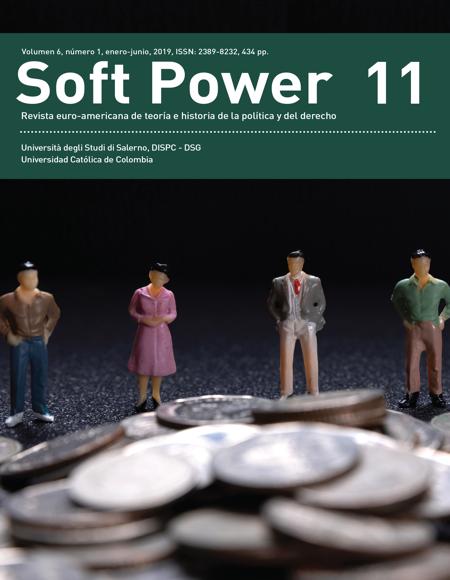Abstract
After the end of the Cold War and the collapse of the Soviet Union, the thesis that the class age was over and, even more so, the class struggle has spread. In this essay I propose to make some considerations on the problem of what Luciano Gallino called “the class struggle from above”. The historical period taken in consideration is the one that began in the seventies of the twentieth century, as a result of a neoliberal political will. The scientific perspective adopted is connected with the elite theory, understood in a broad sense. The essay first of all attempts to clarify the advantages that such an approach could bring to a redefinition of the general question of the class struggle. Secondly, it focuses on the manners of subjectivation by the organized minorities within the “transnational capitalist class”. Thirdly, it illustrates the main forms of power exercised by the organized capitalist minorities, with particular attention to what Charles Lindblom called “structural power”. Finally, it shows how and why structural power is both cause and effect of the erosion of the “political spaces” that ordered the modern world, up to the so-called “Thirty glorious”.

References
Aron, R. (1969). Les désillusions du progrès. Essais sur la dialectique de la modernité. Paris: Calmann-Lévy.
Azzolini, G. (2016a). Les élites politiques et la démocratie. Perspectives théorico-politiques. Le Philosophoire, 46(2), 87-105.
Azzolini, G. (2016b). Sur la nouvelle classe capitaliste, transnationale et dominante? Actuel Marx, 60(2), 28-42.
Azzolini, G. (2017). Dopo le classi dirigenti. La metamorfosi delle oligarchie nell’età globale. Roma-Bari: Laterza.
Basosi, D. (2006). Il governo del dollaro. Interdipendenza economica e potere statunitense negli anni di Richard Nixon (1969-1973). Firenze: Edizioni Polistampa.
Bello, W. (2002). Deglobalization: Ideas for a New World Economy. New York-London: Zed Books.
Bourdieu, P., Passeron, J.-C. (1964). Les héritiers. Les étudiants et la culture. Paris: Minuit.
Carroll, W.K. (2010). The Making of a Transnational Capitalist Class. Corporate Power in the Twentyfirst Century. New York-London: Zed Books.
Cassese, S. (2012). The global polity: global dimensions of democracy and the rule of law. Sevilla: Global Law Press.
Culpepper, P. D. (2015). Structural power and political science in the post-crisis era. Business and Politics, 17(3), 391-409.
Dahrendorf, R. (1959). Class and class conflict in industrial society. London: Stanford University Press.
Dean, J. (2016). Crowds and Party. London-New York: Verso.
Deneault, A. (2010). Offshore. Paradis fiscaux et souveraineté criminelle. Paris: La Fabrique.
Etzioni-Halevy, E. (1993). The Elite Connection: Problems and Potential of Western Democracy. Cambridge: Polity.
Fourastié, J. (1979). Les Trente Glorieuses, ou la révolution invisible de 1946 à 1975. Paris: Fayard.
Fuchs, D. (2013). Theorizing the Power of Global Companies. En J. Mikler (Ed.), The Handbook of Global Companies (pp. 77-95). Oxford: Wiley-Blackwell.
Galli, C. (2001). Spazi politici. L’età moderna e l’età globale. Bologna: il Mulino.
Gallino, L. (2005). L’impresa irresponsabile. Torino: Einaudi.
Gallino, L. (2011). Finanzcapitalismo. La civiltà del denaro in crisi. Torino: Einaudi.
Gallino, L. (2012). La lotta di classe dopo la lotta di classe, entrevista al cuidado de P. Borgna. Roma-Bari: Laterza.
George, S. (2015). Shadow Sovereigns: How Global Corporations are Seizing Power. Cambridge: Polity.
Gramsci, A. (1975). Quaderni del carcere, ed. crítica del Instituto Gramsci, al cuidado de V. Gerratana. Torino: Einaudi.
Green, J. E. (2016). Liberalism and the Problem of Plutocracy, Constellations, 23(1), 84-95.
Kingston, P. W. (2000). The Classless Society. London: Stanford University Press.
Lindblom, C.E. (1977). Politics and Markets: The World’s Political Economic Systems. New York: Basic Books.
Losurdo, D. (2013). La lotta di classe. Una storia politica e filosofica. Roma-Bari: Laterza.
Miliband, R. (1969). The State in Capitalist Society. New York: Basic Books.
Pakulski, J., Waters, M. (1996). The Death of Class. London: Sage.
Piano, N. (2019). Revisiting Democratic Elitism: The Italian School of Elitism, American Political Science, and the Problem of Plutocracy. The Journal of Politics, 81(2), 524-538.
Pijl, K. van der (2012). The Making of an Atlantic Ruling Class. London: Verso.
Poulantzas, N. (1969). The Problem of the Capitalist State. New Left Review, 58(1), 67-78.
Preterossi, G. (2011). La politica negata. Roma-Bari: Laterza.
Robinson, W. I. (2004). A Theory of Global Capitalism: Production, Class, and State in a Transnational World. Baltimore: Johns Hopkins University Press.
Robinson, W. I. (2014). Global Capitalism and the Crisis of Humanity. New York: Cambridge University Press.
Robinson, W. I., Sprague, J. (2018), The Transnational Capitalist Class, en M. Juergensmeyer, M. B. Steger, S. Sassen, V. Faessel (eds.), Oxford Handbook of Global Studies (pp. 309-327). Oxford: Oxford University Press.
Sartori, G. (1987). The Theory of Democracy Revisited, I: The contemporary debate. Chatham, N.J.: Chatham House.
Sklair, L. (2001). The Transnational Capitalist Class. Oxford: Wiley-Blackwell.
Sklair, L. (2009). The Emancipatory Potential of Generic Globalization. Globalizations, 6(4), 525-539.
Sola, G. (2004). ‘Verticale’ e ‘orizzontale’ in politica e in scienza politica, en B. Consarelli (ed.), Metafore dello spazio. “Figure dello spazio, politica e società” - Firenze, 4 aprile 2003 (pp. 97-114). Firenze: Firenze University Press.
Streeck, W. (1992). National Diversity, Regime Competition and Institutional Deadlock: Problems in Forming a European Industrial Relations System. Journal of Public Policy, 12(4), 301-330.
Urry, J. (2014). Offshoring. Cambridge: Polity.
Wilks, S. (2013). The Political Power of the Business Corporation. Cheltenham: Edward Elgar.
Winters, J. A. (2011). Oligarchy. Cambridge: Cambridge University Press.
Wright, E. O. (2015). Understanding Class. London-New York: Verso.
Žižek, S. (2016). Against the Double Blackmail: Refugees, Terror and Other Troubles with the Neighbours. London: Allen Lane.














